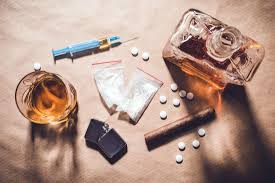





What is Addiction?

In the worlds of medicine and psychology, there is a wide range of thought as to what addiction means. To keep things somewhat simple, addiction will be considered as containing problems in the following categories: problematic repetitive behaviors; activation of brain chemicals (neurotransmitters); Impulse control disorders (brain circuitry activation/thinking). When addiction is broken-down into these three categories (behaviors, brain chemistry, and neural wiring/thinking), we can then begin searching for the types of programming that created dysfunction in these areas. When we look at the relationship among these categories, we can see how addiction plays out, as demonstrated in the graphic above. Emotions, both current and unresolved (unconscious), are activated in the body through neural-networks and chemicals, where they produce what we recognize as cravings/urges (emotions/thoughts). These cravings/urges typically go unnoticed by people until their manifestation as ritualistic programming (repetitive behaviors). At this point there is significant momentum (psychologically, emotionally, behaviorally) and familiarity, so that most are already using (“I’ve already gone this far.”) and enjoying the short, emotional rewards. This is an important step, in that the emotional conditioning from the positive and the upcoming negative stages, are what further entrench the deep emotional/behavioral/psychological programming that started the cycle.
What does treatment look like?
Being a person who cares, who joins in the change process, and has the skills to create change, is where I start. I work with my clients in first hearing their pain and struggle (maybe for the first time) and helping them to understand their unsatisfied needs and the shame that has them feeling trapped. With a reconsidered perspective on their personal history, skills (behavioral/emotional/psychological) are then developed to help with recognition, purpose, and a plan. As a certified addiction counselor (CACIII), I draw from specialized training, to offer a blended therapeutic approach, that includes: cognitive behavioral therapy (CBT), relaxation/visualization (hypnotherapy), and success modeling (NeuroLinguistic Progamming/NLP). Building from this foundation, a functional and achievable map is created to rewire our brain and create lasting change in our actions and emotional patterns.
